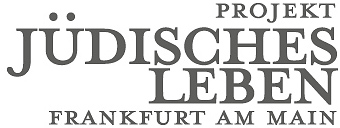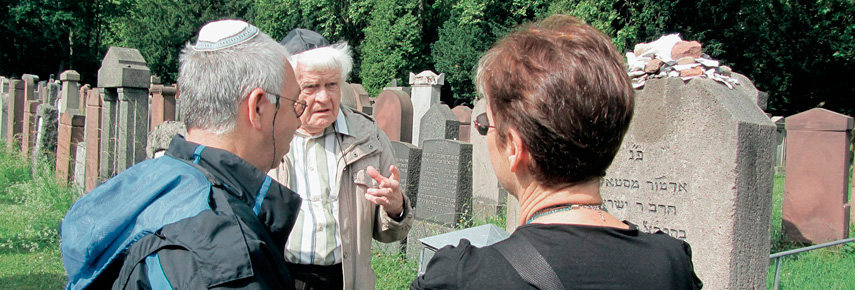Biographical Notes
Dr Pierre Adler
great grandson of Recha Koref
great nephew of Dr Leo Koref),
with his wife Ruth and both daughters Corinne and Marion.
Participants in the visitors’ programme 2016
Recha Koref, née Fleischhauer
• born in Halberstadt on April 10th, 1854
• widow of District Rabbi Dr Mordechai Koref
• mother of eight children
Prosecution:
• Forced to move from Hanau to Frankfurt in November 1938
• Last address: Jewish old people’s home, 6 Wöhlerstraße.
• Deported to Theresienstadt on August 18th, 1942
• Died in Theresienstadt on September 1st, 1942
Dr Leo Koref
• born in Rawitsch, then Prussian district of Posen, on January 1st, 1876
• son of Recha and Dr Mordechai Koref
• lawyer and notary in Hanau
Prosecution:
• Forced to move to Frankfurt as a consequence of the November pogroms in 1938.
• Last address in Frankfurt: 98 Westendstraße.
• Deported to Theresienstadt on August 18th, 1942
• Died in Theresienstadt on October 17th, 1942.
Laying the stumbling stones for Recha and Dr Leo Koref in front of 98 Westendstraße on May 20th, 2016
Sources:
* Hessisches Hauptstaatsarchiv, Wiesbaden
* Martin Hoppe / Monika Rademacher, Eine bedeutende Fotoschenkung – Dr. Leo Koref im Bild. In: Neues Magazin für Hanauische Geschichte von 2012
* Edmund Hadra Collection, Erinnerungen an Theresienstadt, in: Neues Magazin für Hanauer Geschichte 2012
* Onlinegedenkbuch Bundesarchiv
* Frankfurter Deportiertendatenbank
* Hanau Online-Nachrichten; Dr. Leo Koref im Bild, Schenkung an den Hanauer Geschichtsverein 1844 e.V.
* Dr. Wolf Jöckel, Von Frankfurt nach Paris und zurück: Die Stolpersteine in der Westendstraße Stein, Interview with Dr. Pierre Adler, June 9th, 2015, Paris
Photos:
* Family Dr. Adler
* Hessisches Hauptstaatsarchiv, Wiesbaden
* Hanauer Geschichtsverein 1844 e.V.
* Dr. Wolf Jöckel
* Doris Stein
Text und Research:
Doris Stein
Translation:
Gabriele Telgenbüscher
Recha and Leo Koref
“I was deeply moved when I found both names, Recha and Dr Leo Koref, on the commemorative plaque on the wall in Frankfurt”
By Doris Stein
On 20th May 2016 two stumbling stones for Recha Koref and her son Dr Leo Koref were inserted into the pavement in front of the house 98 Westendstraße. Both of them could not have foreseen that this was to be their last address. They had spent the largest part of their lives in Hanau. Hanau was also the last place of residence by choice.
In 2016 Dr Pierre Adler, Recha Koref’s great-grandson, who now lives in Paris, participated in the city of Frankfurt’s visitors’ programme. Together with his wife Ruth and their daughters Corinne and Marion he attended the ceremony of laying the stumbling stones for his great-grandmother and his great-uncle.
Due to the vast destruction of Hanau during World War II, property boundaries in the city centre were radically changed and former addresses could no longer be clearly identified. Therefore the city of Hanau decided against stumbling stones and for setting up a memorial on the old ghetto wall naming all 270 murdered citizens, including Recha and Dr Leo Koref.
A rabbi and his large family in Hanau
Recha Fleischhauer was born in Halberstadt on April 10th 1854. She married the Rabbi Dr Mordechai/Markus Koref, the offspring of an ancient family of rabbis. They moved to Rawitsch, a town, which at that time belonged to the Prussian province of Posen. Five children were born there: Leo, Henriette, Rosa, Lea and Felix. In 1884 her husband became District Rabbi for Hanau. The family of seven moved into the official flat provided by the Hanau parish in Judengasse 56. Here Recha gave birth to her children Fritz, Curt and Else.
After her husband’s death on February 19th 1900 Recha’s oldest son became her main support. Her youngest son Curt was reported missing at the end of World War I. Lea, Else and Felix died in 1932, 1933 respectively. Henriette, Rosa and Fritz managed to emigrate in time. They found shelter in US-American, Swiss and French exile or Palestine.
Leo
Leo was born on January 30th 1876. At the age of six he fell ill with polio, which caused lasting leg paralysis and impairment of his mobility. From then on he had to use crutches or a wheelchair. Yet, Leo was obviously full of energy and zest for life. He attended Hohe Landesschule, where he qualified for university in 1894. He studied law in Berlin, Munich and Marburg. After his exams he gained his degree as Doctor of Laws. From then on he worked as a lawyer at the Hanau District Court and was made notary in 1920. In his office at Marktplatz 16 he employed the lawyer Max Moritz, was a member of the Israelite head office in Hanau and published several articles, e.g. a “Survey of Hanau’s Jewish History” (1910) or on “Inflation laws and Freelance Professions” (1923).
In his memoir the Czech physician, who met Dr Koref in the Theresienstadt concentration camp, enables us to experience firsthand the immense energetic achievement behind Leo Koref’s career: Not only was young Leo stunted in his growth by polio, but also was he not able to attend school at first. His father taught him at home – due to the boy’s talents also in Latin and all the other fields of a classical education. Pushed in a wheelchair and carried – he could finally complete his studies at a classical grammar school. He was among the top students. Dr Hadra writes, ”Even as primus omnium, if I am not mistaken.”
His father who was in considerable financial difficulties and had to feed a large family was not able to support him during his studies at law school. He gave him 200 Marks and told him, ”It’s up to you how far this will get you; you know, I don’t have much. But write if you should need something.” Leo never made use of this offer, to the contrary: He returned the 200 Marks after his first semester: He earned the money necessary for his studies as a private tutor.
Dr Hadra also refers to Dr Koref’s travels, which he undertook in spite of his massive handicap: He went to Switzerland, Italy and even to the USA! “No difficulties could prevail over the triumph of his mind, his will.”
The former Hanau councillor for cultural affairs, Oskar Schenk, also holds Dr Leo Koref in high esteem, when he praises him, “as a gifted and conscientious lawyer” who by “open-mindedness, fair behaviour and philanthropy established a thriving law office. His clients were in good hands. Even when they were not able to pay the legal fees, he was entitled to, he did everything in his power for them. He was a good man in the truest sense of the word. Many a person quietly received his financial support. It was known in legal circles that he supported trainee lawyers who had to cope with economic difficulties by inviting them to dinner at the former Hanau Civic Society. Hanau’s judges respected him and held him in high esteem because of his excellent briefs and his considerate and honourable behaviour in court.”
Leo Koref and his widowed mother Recha lived on the first floor in 12 Corniceliusstraße, Hanau.
Deprivation of rights and persecution of the Koref family started with the National Socialists coming into power. Recha’s and Leo’s life changed fundamentally. On the basis of the new “act to restore the civil service” (Gesetz zur Wiederherstellung des Berufsbeamtentums) Leo was banned from his office as notary as early as June 7th 1933. On November 30th 1938 he lost his licence to practise law. From November 1938 to March 31st 1939 he was allowed to work as a legal consultant (Rechtskonsulent) for Jews in the regional courts of Hanau and Marburg. His flat in 12 Corniceliusstraße served as his office.
The pogroms of November 1938 constituted the next step towards the holocaust. “In the evening hours of November 13th 1938 several masked National Socialists forcibly entered the flat on the first floor. They threatened Leo’s mother with a pistol, punched Leo, smashed a bottle on his head, broke his crutches, destroyed and looted his furniture, stole jewellery, several thousand Reichsmarks and a typewriter, cut up carpets and upholstery. Although the crime was reported immediately, the perpetrators were never found out.” (Martin Hoppe und Monika Rademacher, Eine bedeutende Fotoschenkung, Dr. Leo Koref im Bild)
Dr Seufert, a Hanau physician, arranged for Leo to be taken to the Jewish hospital in Frankfurt. For the time being his mother Recha was accommodated in a Jewish old people’s home in Frankfurt. The house in 12 Corniceliusstraße had to be sold.
Recha and Leo Koref in Frankfurt
On April 1st 1939 Leo Koref moved to 98 Westendstraße. His great-nephew Dr Pierre Adler reports, “(In Westendstraße) my great–uncle lived on the fourth floor. My great-grandmother lived in another house about a half hour’s walk away. Jews were no longer allowed to use public transport. Therefore she had to walk to get to her son. And then she had to crawl up the stairs to the fourth floor. She was 88 years old at that time.”
In Frankfurt Dr Leo Koref was forced to sign so-called “Heimeinkaufsverträge. People who signed these contracts were made to believe they would thus finance spending their remaining years in an old people’s home. Dr Leo Koref had to pay 3.200 Reichsmarks for his mother and 22.831 Reichsmark for himself.
The formerly well-to-do and wealthy lawyer Dr Leo Koref now had to struggle for every single Mark he needed for his mother’s and his own livelihood. He wrote several letters of appeal, among others to the exchange control office in Frankfurt Goethestraße, to the chief inland revenue office in Kassel, to the Central council of Jews in Germany, Berlin. He crossed out his name, address, his title and his Hanau telephone number and bank account embossed in his writing paper and substituted “Dr Leo Koref” by “Israel Koref”. All his assets, his life-insurance, the gains from selling his house in Corniceliusstraße were “secured”, just like Recha’s bank book and the pension she was entitled to as the widow of Dr Markus Koref, the District Rabbi. In his letters Leo asserted that he did not in any way intend to withdraw his assets from the Reich. He was far from leaving. He referred to his mother’s age and the fact that both his legs were paralysed. In vain, Recha as well as Leo had to compile detailed lists of their immediate needs “spending money for their livelihood”. Only a part of the amount thus determined was granted. (Hessisches Staatsarchiv, 519/3 Nr. 3667 and 3598; 676/7794).
The last way
In the seventh massive deportation wave Leo Koref together with his mother of 88 was deported to the transit and concentration camp Theresienstadt on August 18th 1942.At that time he was in the Jewish hospital in 36 Gagernstraße, Frankfurt, and his mother was in the Jewish old people’s home in 6 Wöhlerstraße. Mother and son were separated immediately. Dr Hadra remembers,”He was taken to the infirmary and his mother to private accommodation. Before he could succeed in finding the old woman, she had succumbed to the exertions of the first days in Theresienstadt. Proobably she had not been able to cope with having to spend the nights on the bare floor without a blanket to cover with.”
Recha Koref died on September 1st 1942. Her son Leo died only a few weeks later on October 17th 1942.

